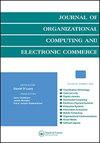Examining the Mediating Roles of Green Image and Readiness in Firms’ Green Information Technology Practices: An Organizational Legitimation Perspective
IF 1.9
4区 管理学
Q3 COMPUTER SCIENCE, INFORMATION SYSTEMS
Journal of Organizational Computing and Electronic Commerce
Pub Date : 2022-04-03
DOI:10.1080/10919392.2022.2069455
引用次数: 0
Abstract
ABSTRACT This study proposes a dual-path view to explain firms’ green information technology (GIT) practices from the organizational legitimation lens. It explicates essential influence pathways that shape firms’ responses to essential external pressures for environmental sustainability, including the general public’s awareness of environmental protection, industry norms, and competitors’ green practices. This study emphasizes the mediating roles of a firm’s pursuit of a green image and its readiness for green practices, which represent symbolic and substantive legitimacy actions, respectively. Survey data from 152 leading manufacturers and 152 service firms in Taiwan are used to test the hypotheses empirically. The results show that the general public’s environmental awareness, industry norms, and competitors’ green practices influence firms’ GIT practices through their pursuit of a green image and green readiness. A comparative analysis further indicates that green readiness mediates the effects of external pressures for service firms but not for manufacturers, whereas the pursuit of a green image mediates the impacts of external pressures for manufacturing firms but not for service firms.检验绿色形象和企业绿色信息技术实践准备的中介作用:一个组织合法性的视角
本研究提出了一个双路径的观点,从组织合法性的角度来解释企业的绿色信息技术(GIT)实践。它阐明了企业对环境可持续性的基本外部压力的反应的基本影响途径,包括公众的环境保护意识、行业规范和竞争对手的绿色实践。本研究强调了企业对绿色形象的追求及其对绿色实践的准备程度的中介作用,这分别代表了象征性和实质性的合法性行动。本研究以台湾152家制造业龙头企业和152家服务业龙头企业的调查数据为样本,进行实证检验。结果表明,公众的环境意识、行业规范和竞争对手的绿色实践通过企业对绿色形象的追求和绿色准备程度影响企业的GIT实践。比较分析进一步表明,绿色准备对服务企业外部压力的影响起中介作用,而对制造企业外部压力的影响没有中介作用,而对绿色形象的追求对制造企业外部压力的影响没有中介作用。
本文章由计算机程序翻译,如有差异,请以英文原文为准。
求助全文
约1分钟内获得全文
求助全文
来源期刊

Journal of Organizational Computing and Electronic Commerce
工程技术-计算机:跨学科应用
CiteScore
5.80
自引率
17.20%
发文量
7
审稿时长
>12 weeks
期刊介绍:
The aim of the Journal of Organizational Computing and Electronic Commerce (JOCEC) is to publish quality, fresh, and innovative work that will make a difference for future research and practice rather than focusing on well-established research areas.
JOCEC publishes original research that explores the relationships between computer/communication technology and the design, operations, and performance of organizations. This includes implications of the technologies for organizational structure and dynamics, technological advances to keep pace with changes of organizations and their environments, emerging technological possibilities for improving organizational performance, and the many facets of electronic business.
Theoretical, experimental, survey, and design science research are all welcome and might look at:
• E-commerce
• Collaborative commerce
• Interorganizational systems
• Enterprise systems
• Supply chain technologies
• Computer-supported cooperative work
• Computer-aided coordination
• Economics of organizational computing
• Technologies for organizational learning
• Behavioral aspects of organizational computing.
 求助内容:
求助内容: 应助结果提醒方式:
应助结果提醒方式:


